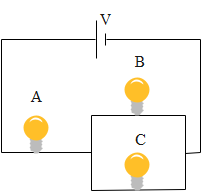Question
Question: In the circuit shown, three identical light bulbs connected to a battery. The brightness of the bulb...
In the circuit shown, three identical light bulbs connected to a battery. The brightness of the bulb

- A < B = C
- A > B = C
- A = B = C
- A < B < C
Solution
The brightness of a bulb is directly proportional to the amount of current flowing through the bulb. The bulbs are identical and by using the fact that the current will remain same for the bulbs connected in series while the voltage will remain same in the parallel combination of bulbs, we can compare the brightness of the various bulbs.
Complete step by step answer:
We are given an electric circuit which has three identical light bulbs connected to a battery as shown in the circuit.
Since the bulbs are identical then let R be the resistance of each bulb. For the two bulbs connected in parallel with each other, the equivalent resistance is given as
RP1=R1+R1=R2 RP=2R
Now the equivalent resistance of the whole circuit is given by the series combination of R and RP as follows:
Req=R+RP=R+2R=23R
Now the total current through the circuit can be written as
I=ReqV=3R2V
Since current remains same in the series combination, the current through bulb A is given as
IA=3R2V
In a parallel combination of bulbs B and C, the current gets equally divided between B and C since their resistances are the same. So, the currents through them are given as
IB=IC=3RV
Therefore, we have
IA>IB=IC
Now as we know that brightness of the bulb is directly proportional to the amount of current flowing through the bulb, therefore the brightness of the bulbs is also given in the same way as the above expression as follows:
A > B = C
Hence, the correct answer is option 2.
Note:
It should be noted that the bulbs which are connected in parallel to each other have the same brightness. Because of this reason, it is advisable to connect devices in parallel to each other so that they have brightness rather than in series, where the brightness can be different.
